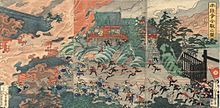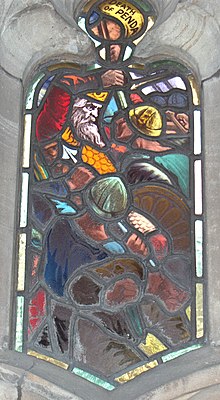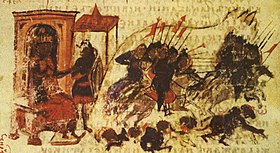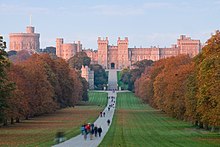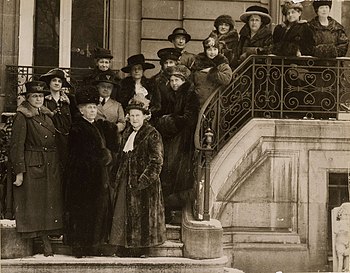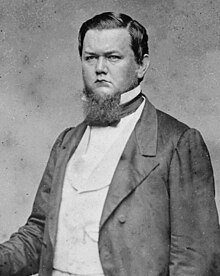
Back Portaal:Geskiedenis Afrikaans Portal:Gschicht ALS በር:ታሪክ Amharic Ingang:Stǣr ANG بوابة:التاريخ Arabic قيسارية:تاريخ ARY بوابة:التاريخ ARZ Портал:Тарих AV Tuveli:Izvopa AVK Portal:Tarix Azerbaijani
The History Portal
History (derived from Ancient Greek ἱστορία (historía) 'inquiry; knowledge acquired by investigation') is the systematic study and documentation of the human past.
The period of events before the invention of writing systems is considered prehistory. "History" is an umbrella term comprising past events as well as the memory, discovery, collection, organization, presentation, and interpretation of these events. Historians seek knowledge of the past using historical sources such as written documents, oral accounts, art and material artifacts, and ecological markers. History is incomplete and still has debatable mysteries.
History is an academic discipline which uses a narrative to describe, examine, question, and analyze past events, and investigate their patterns of cause and effect. Historians debate which narrative best explains an event, as well as the significance of different causes and effects. Historians debate the nature of history as an end in itself, and its usefulness in giving perspective on the problems of the present.
Stories common to a particular culture, but not supported by external sources (such as the tales surrounding King Arthur), are usually classified as cultural heritage or legends. History differs from myth in that it is supported by verifiable evidence. However, ancient cultural influences have helped create variant interpretations of the nature of history, which have evolved over the centuries and continue to change today. The modern study of history is wide-ranging, and includes the study of specific regions and certain topical or thematic elements of historical investigation. History is taught as a part of primary and secondary education, and the academic study of history is a major discipline in universities.
Herodotus, a 5th-century BC Greek historian, is often considered the "father of history", as one of the first historians in the Western tradition, though he has been criticized as the "father of lies". Along with his contemporary Thucydides, he helped form the foundations for the modern study of past events and societies. Their works continue to be read today, and the gap between the culture-focused Herodotus and the military-focused Thucydides remains a point of contention or approach in modern historical writing. In East Asia, a state chronicle, the Spring and Autumn Annals, was reputed to date from as early as 722 BC, though only 2nd-century BC texts have survived. (Full article...)
Featured picture
Did you know (auto generated)

- ... that activist Gerlin Bean co-founded the Organisation of Women of African and Asian Descent in 1978, an event described as "a watershed in the history of Black women's rights activism"?
- ... that during the first tour to the Soviet Union by any American ballet company, Lupe Serrano danced the first encore in the American Ballet Theatre's history?
- ... that at the age of 28, Mason Morelli became the first player in Vegas Golden Knights franchise history to record two points in their National Hockey League debut game?
- ... that no one laughed at the worst joke in legal history?
- ... that Fernando Cajías, who belongs to the first generation of professional historians in Bolivia, composed part of history academia's "Mirista wing"?
- ... that the 2016 Jim Beam strike was the first labor strike in the company's history?
Jovan Vladimir or John Vladimir (Serbian Cyrillic: Јован Владимир; c. 990 – 22 May 1016) was the ruler of Duklja, the most powerful Serbian principality of the time, from around 1000 to 1016. He ruled during the protracted war between the Byzantine Empire and the Bulgarian Empire. Vladimir was acknowledged as a pious, just, and peaceful ruler. He is recognized as a martyr and saint, with his feast day being celebrated on 22 May.
Jovan Vladimir had a close relationship with Byzantium but this did not save Duklja from the expansionist Tsar Samuel of Bulgaria, who conquered the principality around 1010 and took Vladimir prisoner. A medieval chronicle asserts that Samuel's daughter, Theodora Kosara, fell in love with Vladimir and begged her father for his hand. The tsar allowed the marriage and returned Duklja to Vladimir, who ruled as his vassal. Vladimir took no part in his father-in-law's war efforts. The warfare culminated with Tsar Samuel's defeat by the Byzantines in 1014 and death soon after. In 1016, Vladimir fell victim to a plot by Ivan Vladislav, the last ruler of the First Bulgarian Empire. He was beheaded in front of a church in Prespa, the empire's capital, and was buried there. He was soon recognized as a martyr and saint. His widow, Kosara, reburied him in the Prečista Krajinska Church, near his court in southeastern Duklja. In 1381, his remains were preserved in the Church of St Jovan Vladimir near Elbasan, and since 1995 they have been kept in the Orthodox cathedral of Tirana, Albania. The saint's remains are considered Christian relics, and attract many believers, especially on his feast day, when the relics are taken to the church near Elbasan for a celebration. (Full article...)On this day
- 1826 – In York, Upper Canada, members of the Family Compact destroyed William Lyon Mackenzie's printing press in the Types Riot after Mackenzie accused them of corruption.
- 1862 – American Civil War: The Confederate Army won a resounding victory at the Battle of Cross Keys, one of the two decisive battles in Jackson's Valley campaign.
- 1929 – Margaret Bondfield (pictured) became the first female member of the Cabinet of the United Kingdom when she was named Minister of Labour by Ramsay MacDonald.
- 1941 – World War II: The Allies commenced the Syria–Lebanon campaign against Vichy French possessions in the Levant.
- 1953 – An F5 tornado struck Flint and Beecher, Michigan, causing 116 fatalities, 844 injuries and $19 million in damage during a larger tornado outbreak sequence.
- William of York (d. 1154)
- Cora Agnes Benneson (d. 1919)
- Lauren Burns (b. 1974)
- Omar Bongo (d. 2009)
Selected quote
There cannot be two suns in the sky, nor two emperors on the earth.
— Confucius, Chinese Sage and Philosopher
Related portals
More Did you know...
- ... that the Japanese aircraft carrier Amagi (wreck pictured) capsized on 29 July 1945 as a result of cumulative damage inflicted by American airstrikes on 24 and 28 July?
- ... that Scandinavian influence in Scotland, still evident today, was probably at its height during the time of Thorfinn the Mighty?
- ... that, after the 2003 invasion of Iraq, the Bassetki statue, which is more than 4,200 years old, was found in a cesspool?
- ... that in medieval art, angels were often depicted wearing feather tights?
- ... that 49% of German military losses happened in the last 10 months of the Second World War in Europe?
- ... that Joshua L. Goldberg, the first rabbi to serve as a World War II U.S. navy chaplain, was a Russian army deserter?
- ... that Richard Nixon chose the Wilson desk as his Oval Office desk because he believed it was used by Woodrow Wilson, informed that it was used by Henry Wilson, Vice President under Ulysses S. Grant, but actually bought by Garret Augustus Hobart, 24th Vice President of the United States under President William McKinley?
- ... that some of the nominally silver Roman coins from the Bredon Hill Hoard only have a 1% silver content?
Topics
Categories

History • By period • By region • By topic • By ethnic group • Historiography • Archaeology • Books • Maps • Images • Magazines • Organizations • Fictional • Museums • Pseudohistory • Stubs • Timelines • Chronology • People • Wikipedia historians
WikiProjects
![]() WikiProject History •
Ancient Near East • Australian History • Classical Greece and Rome • Dacia • Former countries • History of Canada • Chinese history • European history • Heraldry and vexillology • Indian history • Jewish history • Medieval Scotland • Mesoamerica • Military history • Middle Ages • History of Science
WikiProject History •
Ancient Near East • Australian History • Classical Greece and Rome • Dacia • Former countries • History of Canada • Chinese history • European history • Heraldry and vexillology • Indian history • Jewish history • Medieval Scotland • Mesoamerica • Military history • Middle Ages • History of Science
WikiProject Time • Days of the Year • Years
WikiProject Biography • Composers • Political figures • Saints • United States Presidents
Things you can do
 |
Here are some tasks awaiting attention:
|
Associated Wikimedia
The following Wikimedia Foundation sister projects provide more on this subject:
-
Commons
Free media repository -
Wikibooks
Free textbooks and manuals -
Wikidata
Free knowledge base -
Wikinews
Free-content news -
Wikiquote
Collection of quotations -
Wikisource
Free-content library -
Wikiversity
Free learning tools -
Wiktionary
Dictionary and thesaurus
© MMXXIII Rich X Search. We shall prevail. All rights reserved. Rich X Search



